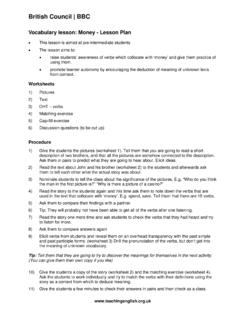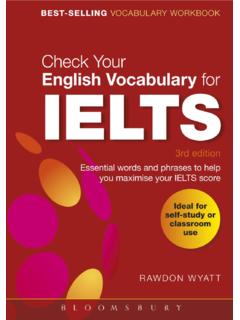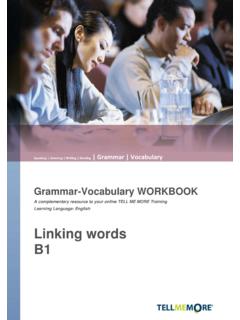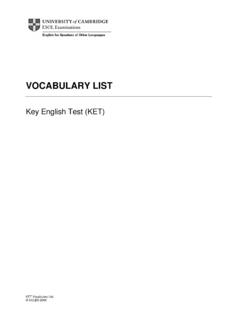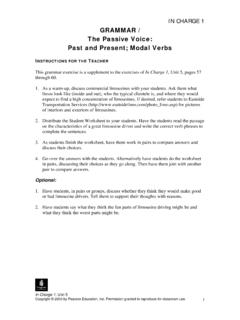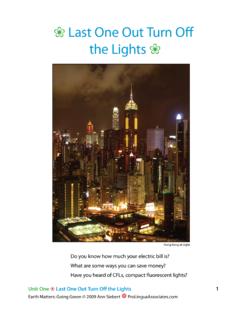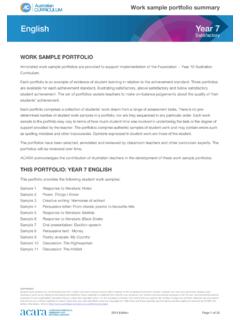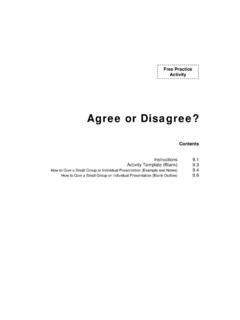Transcription of Collocations Ise - Kho sách
1 Collocations Michael McCarthy Felicity O'Dell CAMBRIDGE in Ise o How words work together for fluent and natural English Self-study and classroom use Contents Acknowledgements 3 To the student (and the teacher) 4 Learning about Collocations 1 What is a collocation? 2 Finding, recording and learning Collocations 3 Using your dictionary 4 Types of collocation 5 Register Grammatical aspects of Collocations 6 Intensifying adverbs highly unlikely, utterly ridiculous, strongly object 7 Everyday verbs 1 make a mistake, do your best, do damage 8 Everyday verbs 2 go bald, become extinct, fall ill 9 Everyday verbs 3 have fun, take action, pay a compliment Special aspects of collocation 10 Synonyms and confusable words 1 close a meeting, antique furniture, only child 11 Synonyms and confusable words 2 gain power, achieve your goals.
2 Defeat an opponent 12 Metaphor sunny smile, ideas flow, heated discussion Topics: Travel and the environment 13 Weather strong wind, blanket of fog, river bursts its banks 14 Travel tiring journey, aisle seat, family-run hotel 15 Countryside surrounding countryside, well worth seeing 16 Towns and cities lined with shops, sprawling city, volume of traffic Topics: People and relationships 17 People: character and behaviour have a vivid imagination, lose your patience 18 People: physical appearance slender waist, immaculately groomed 19 Families distant cousin, expecting a baby, stable home 20 Relationships casual acquaintance, love at first sight 21 Feelings and emotions lasting happiness, worried sick, emotional wreck Topics.
3 Leisure and lifestyle 22 Houses, flats and rooms move into a flat, spacious living room 23 Eating and drinking nourishing meal, spoil your appetite, dying of hunger 24 Films and books film critic, go on the stage, renew a library book 25 Music give a performance, go on tour, strum a guitar 26 Sport go snowboarding, take a penalty 11 Health and illness catch a cold, vigorous exercise, be taken ill Topics: Work and study 28 Computers forward a message, e-mail bounces 29 Study and learning do research, attend a lecture, first draft 30 Work high-powered job, hand in your notice 31 Business set up a business, launch a product, rival company English Collocations in Use I 32 Academic writing 1: giving opinions 33 Academic writing 2: structuring an argument key factor, challenge a theory, carry out research make reference to, argue convincingly, research suggests Topics.
4 Society and 34 Laws and punishments 35 Crime 36 News 37 Money 38 War and peace 39 Global problems Basic concepts 40 Time 41 Sound 42 Distance and size 43 Colour and light 44 Texture 45 Taste and smell 46 Number and frequency 47 Movement and speed 48 Change 49 Ways of speaking 50 Ways of walking Functions 51 Starting and finishing 52 Talking about success and failure 53 Talking about cause and effect 54 Remembering and sensing 55 Agreeing and disagreeing 56 Talking about beliefs and opinions 57 Deciding and choosing 58 Claiming and denying 59 Liking and disliking 60 Praising and criticising institutions break the law, bend the rules, fair trial hardened criminal, juvenile crime, tackle crime hit the headlines, hold talks, take hostage squander money, price soars, go cheap war breaks out, restore order, call a truce irreparable damage, eradicate poverty, earthquake hits save time, ungodly hours, from dawn till dusk break the silence, excessive noise, almighty bang within commuting distance, painfully thin bright colour, beam of light, shed some light on choppy sea, soft pillow, ice melts fragrant perfume, have a taste, smell danger significant number, come to a total of, rare species prompt payment, painfully slow, lose your balance make an adjustment, break a habit, change the subject brief chat, raise a subject, drop a hint pace up and down, wander aimlessly, faltering steps promising start, bring something to an end make a breakthrough, fail miserably cause alarm.
5 Adverse effects, have a major impact vaguely remember, blot out a memory, have a feeling settle a dispute, agree to differ, heated argument firmly believe, colour someone's judgement arrive at a decision, have second thoughts, tough choi make the point that, contradictory evidence have a liking, state a preference, take offence offer your congratulations, speak highly of Key Index 126 159 2 English Collocations in Use What is a collocation? We say .. fast cars fast food a quick glance a quick meal We don't say .. quick food a fes* glance a fest meal A collocation is a pair or group of words that are often used together. These combinations sound natural to native speakers, but students of English have to make a special effort to learn them because they are often difficult to guess.
6 Some combinations just sound 'wrong1 to native speakers of English. For example, the adjective fast collocates with cars, but not with a glance. Learning Collocations is an important part of learning the vocabulary of a language. Some Collocations are fixed, or very strong, for example take a photo, where no word other than take collocates with photo to give the same meaning. Some Collocations are more open, where several different words may be used to give a similar meaning, for example keep to/ stick to the rules. Here are some more examples of Collocations . You must make an effort and study for your exams (NOT de an effort) Did you watch TV last night? (NOT look at TV) This car has a very powerful engine. It can do 200 km an hour. (NOT strong engine) There are some ancient monuments nearby. (NOT antique monuments) Sometimes, a pair of words may not be absolutely wrong, and people will understand what is meant, but it may not be the natural, normal collocation.
7 If someone says / did a few mistakes they will be understood, but a fluent speaker of English would probably say I made a few mistakes. Compounds and idioms Compounds are units of meaning formed with two or more words. Sometimes the words are written separately, sometimes they have a hyphen and sometimes they are written as one word. Usually the meaning of the compound can be guessed by knowing the meaning of the individual words. Some examples of compounds are car park, post office, narrow-minded, shoelaces, teapot. It is not always easy to separate Collocations and compounds and, where they are useful for learners or an important part of the vocabulary of a topic, we include some compounds in this book too. Idioms are groups of words in a fixed order that have a meaning that cannot be guessed by knowing the meaning of the individual words.
8 For example, pass the buck is an idiom meaning 'to pass responsibility for a problem to another person to avoid dealing with it oneself. We deal with idioms in detail in the book English Idioms in Use in this series. Why learn Collocations ? Learning Collocations is a good idea because they can: a) give you the most natural way to say something: smoking is strictly forbidden is more natural than smoking is strongly forbidden. b) give you alternative ways of saying something, which may be more colourful/expressive or more precise: instead of repeating It was very cold and very dark, we can say It was bitterly cold and pitch dark. c) improve your style in writing: instead of saying poverty causes crime, you can say poverty breeds crime; instead of saying a big meal you can say a substantial meal.
9 You may not need or want to use these in informal conversations, but in writing they can give your text more variety and make it read better: this book includes notes about formality wherever the Collocations are especially formal or informal. 6 English Collocations in Use Exercises I. I Read A and B and answer these questions. 1 What is a collocation? 2 Which of these words does fast collocate with: car, food, glance, meal? 3 Which of these are compounds: computer, narrow-minded, teapot, ancient monument, car park ? 4 What do we call expressions like pass the buck and be over the moon} Make ten Collocations from the words in the box. an effort ancient bitterly make breakfast cold dark engine forbidden mistakes have make meal monument pitch powerful strictly substantial TV watch Are these statements about Collocations true or false?
10 1 Learning Collocations will make your English sound more natural. 2 Learning Collocations will help you to express yourself in a variety of ways. 3 Learning Collocations will help you to write better English. 4 Using Collocations properly will get you better marks in exams. 5 You will not be understood unless you use Collocations properly. Put the expressions from the box into the correct category in the table below. make a mistake a storm in a tea cup live music checkpoint key ring pull somebody's leg heavy snow valid passport teapot bitterly disappointed compound collocation idiom Underline the Collocations in this text. When I left university I made a decision to take up a profession In which I could be creative. I could play the guitar, but I'd never written any songs.
